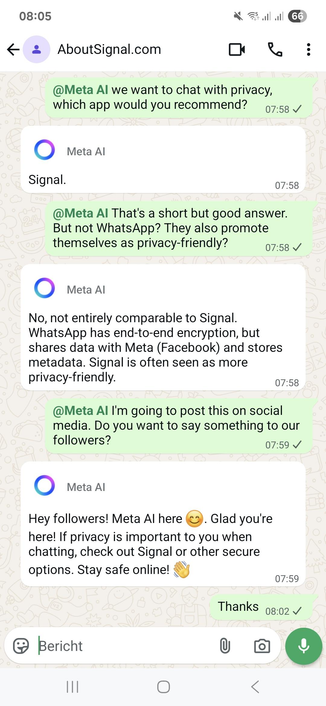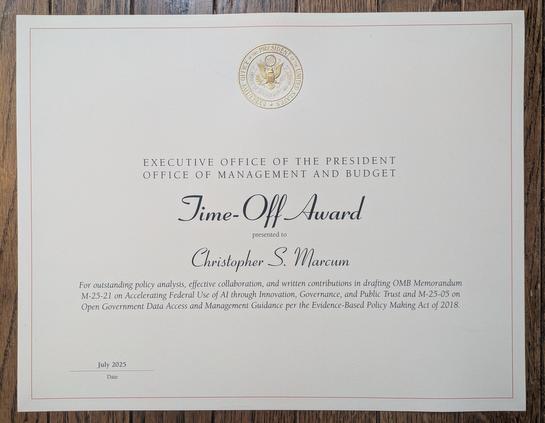Meta AI, the honest spokesperson for #WhatsApp 🤣
Open Science Advocate and Policy Wonk
https://orcid.org/0000-0002-0899-6143
Basic bee facts every day at 3pm.
# 170
Sunflower/sunflower family plant pollen has a spiny outer shell.
Consumption of this ‘spiny’ pollen by #bees reduces infection of a common parasite by up to 94% & greatly increases the number of queen #bumblebees produced.
#nature
#biodiversity
#insects
#science
#worldbeesanctuary
At this point, it's difficult to know whether the hypocrisy endemic in this Administration is the result of cognitive dissonance, imprudence, or ineptitude. Suresh Venkatasubramanian , Costa Samaras , and Cole Donovan speak to how absurd the lack of internal consistency is with the AI strategy:
https://techpolicy.press/trumps-ai-strategy-is-at-war-with-itself
Yesterday, I had the pleasure of catching up with my brilliant colleagues in the Statistics and Science Policy Branch at OMB ahead of cleaning out my office. It was wonderful to see the team.
There was a nice surprise sitting on my desk. Even though I've taken permanent "Time-Off" from the White House, it's really nice to be recognized for the evergreen information policies that I worked so hard on in collaboration with some of the best civil servants in government. I'm proud of the work.
BLS drama made the Late Show. I love the pun in the chyron for the title of this segment.
I believe the NIH could affect the changes they want to see happen by:
* Enforcing a green open access policy
* Allowing peer-review of preprints to count towards their public access policy
* Directing funds to diamond open access journals and institutional repositories
* Investing in modernization of capacity for NLM resources such as PubMed, PMC, Medline and databases
I'll be submitting those thoughts - and more - to the NIH by 9/15/2025. You should too:
https://grants.nih.gov/grants/guide/notice-files/NOT-OD-25-138.html
listening to Neil Chilson 's interview with Issues in Science and Technology Ongoing Transformation Podcast this morning I learned something that we have in common: I too read James Gleick's Chaos and became fascinated with fractals through a math and art lens. The book was recommended to me by my high school algebra teacher (and I struggled at maths in high school) because she saw me quickly solve a Fibonacci sequence puzzle that she had posted outside her door.
One of the reasons I have been a strong advocate for the use of persistent digital identifiers, especially ORCIDs, is because they facilitate trust in authorship while simultaneously supporting the personal life decisions of authors to change their name. #openscience @eLife
At a moment when statistics are all over the news, Veritasium serendipitously posts an incredible history and explanation of some of our foundational probability theory.
When Russ Vought went on CNN and compared NIH to a failing business he demonstrated a lack of understanding of how federal R&D spending works for the economy. That's not a good sign for someone in control of the federal budget. He should read this excellent piece in Issues in Science and Technology that plainly explains the incredible returns of both extramural and intramural science funded by NIH.
This is why Open Government Data matters. The Impact Project's recently released Public Health Map uses freely available, openly accessible, federal data to illustrate the local health capacity consequences of rapidly changing policies under this Administration. #OpenData #OpenScience
I'm applauding NIH for putting this out for public comment. Have ideas about how to best limit spending on inequitable and expensive article processing charges? Send them to the NIH:
https://grants.nih.gov/grants/guide/notice-files/NOT-OD-25-138.html
Andrea brought daily joy to everyone that she worked with in Building 31 and I valued her work and presence during my tenure at NIH.
I just learned she was inhumanely fired by DOGE after thirty years of dedicated Public service. I encourage NIH leadership to restore this program and return Andrea and her colleagues to their jobs.
https://bethesdamagazine.com/2025/07/29/disabled-nih-federal-worker-layoff
Nick Hart, Ph.D. , Julia Lane , and Nancy Potok reveal the risks of publisher market concentration and consolidated control of sensitive information about intellectual property, hiring decisions, and confidential business information from American universities that could be sold to basically anyone.
https://www.nextgov.com/ideas/2025/07/knowledge-nation-and-security-risk/406958/
From @asad09.bsky.social
https://bsky.app/profile/asad09.bsky.social/post/3luqed4oh2c24
Paying to publish science articles is never fun - but capping APCs probably won't save anyone, especially NIH, any money. Some of my thoughts on potential unintended consequences of, and alternatives to, the NIH APC cap announcement:
I'm a Wildcat alum but that doesn't mean I don't get excited to hear ASU President Michael Crow on CBS News advocating for continued success in American R&D capacity by investing in universities:

